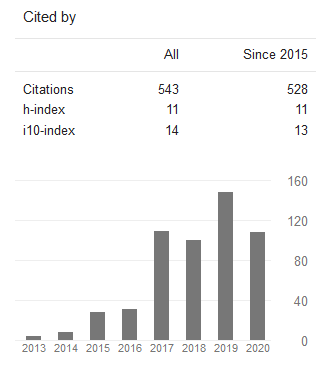Implementasi Algoritma K-Nearest Neighbour dalam Menganalisis Sentimen Terhadap Program Merdeka Belajar Kampus Merdeka (MBKM)
DOI:
https://doi.org/10.24002/jbi.v14i01.7178Keywords:
MBKM, NLP, K-NN, F1-ScoreAbstract
K-Nearest Neighbor Algorithm Implementation in sentiment analysis towards Merdeka Belajar Kampus Merdeka (MBKM) Program. Merdeka Belajar Kampus Merdeka (MBKM) is a program that supports students to improve their skills by having direct experience in the work environment to prepare for competition and a future career. MBKM program has been implemented by Indonesia's Ministry of Education, Culture, Research, and Technology (Kemendikbudristek) since 2020. Every policy needs to be evaluated; a simple evaluation can be done through sentiment analysis to determine public responses to the MBKM program. The results are used as suggestions for program improvement. Sentiment analysis is done by applying the Natural Language Processing (NLP) algorithm to process crawled data from Twitter, then classified using the K-NN Algorithm. Based on the results, the sentiment is neutral. This illustrates that people are only partially interested in the MBKM program policy. The accuracy of the classification model using the K-NN algorithm is 95%, and an F1-score value of 0.96 for the classification model with a ratio of 80% training data and 20% test data.
Keywords: MBKM, NLP, K-NN, F1-Score
Program Merdeka Belajar Kampus Merdeka (MBKM) merupakan suatu kebijakan dalam mendukung pemberian kebebasan terhadap mahasiswa untuk mengasah kemampuan dengan merasakan langsung pengalaman di dunia kerja sebagai bekal untuk menghadapi persaingan dan persiapan berkarir di masa mendatang. Program MBKM mulai diberlakukan oleh Kementerian Pendidikan Kebudayaan Riset dan Teknologi (Kemendikbudristek) Republik Indonesia sejak tahun 2020. Setiap kebijakan tentunya perlu dievaluasi, evalusi sederhana dapat dilakukan melalui analisis sentimen untuk mengetahui tanggapan masyarakat mengenai program MBKM. Hasilnya digunakan sebagai saran perbaikan untuk pengembangan program. Analisis sentimen dilakukan dengan menerapkan algoritma Natural Language Processing (NLP) untuk memproses data hasil crawling dari Twitter, selanjutnya diklasifikasikan menggunakan algoritma K-NN. Berdasarkan hasil analisis diperoleh bahwa sentimen masyarakat bersifat netral. Hal ini menggambarkan bahwa masyarakat tidak sepenuhnya tertarik terhadap kebijakan program MBKM, sedangkan untuk tingkat akurasi model klasifikasi menggunakan algoritma K-NN sebesar 95% dan nilai F1-score sebesar 0,96 untuk model klasifikasi dengan perbandingan 80% data latih dan 20% data uji.
Kata Kunci: MBKM, NLP, K-NN, F1-Score
References
L. Zhang, S. Wang, and B. Liu, “Deep learning for sentiment analysis: A survey,” Wiley Interdiscip Rev Data Min Knowl Discov, vol. 8, no. 4, Jul. 2018, doi: 10.1002/widm.1253.
G. Xu, Y. Meng, X. Qiu, Z. Yu, and X. Wu, “Sentiment analysis of comment texts based on BiLSTM,” IEEE Access, vol. 7, pp. 51522–51532, 2019, doi: 10.1109/ACCESS.2019.2909919.
D. Alita, S. Priyanta, and N. Rokhman, “Analysis of Emoticon and Sarcasm Effect on Sentiment Analysis of Indonesian Language on Twitter”, Journal of Information Systems Engineering and Business Intelligence, vol. 5, no. 2, pp. 100, Oct. 2019, doi:10.20473/jisebi.5.2.100-109.
H. Saif, Y. He, and Alani, “Semantic Sentiment Analysis of Twitter International Semantic Web Conference, vol. 11, 2012. doi: 10.1007/978-3-642-35176-1.
M. A. Rizaty, “Pengguna Twitter di Indonesia Capai 18,45 Juta pada 2022” DataIndonesia.id, Aug. 10, 2022.
B. Gnana Priya, “Emoji Based Sentiment Analysis Using Knn B.Gnana Priya” 2019. [Online]. Available: https://www.researchgate.net/publication/357047761
S. Vijay Gaikwad, “Text Mining Methods and Techniques,” International Jurnal of Computer Applications, vol. 85, no. 17, 2014. doi: 10.5120/14937-3507
R. Prabowo dan M. Thelwall, “Sentiment Analysis: A Combined Approach” Journal of Informetrics, vol. 3, pp 143-157, Apr. 2009
P. Gonçalves, M. Araújo, F. Benevenuto, and M. Cha, “Comparing and combining sentiment analysis methods” COSN 2013 - Proceedings of the 2013 Conference on Online Social Networks, Association for Computing Machinery, pp. 27–37, 2013 doi:10.1145/2512938.2512951.
A. R. Lubis, S. Prayudani, M. Lubis, and O. Nugroho, “Sentiment Analysis on Online Learning during the Covid-19 Pandemic Based on Opinions on Twitter using KNN Method” International Conference on Information System and Information Technology, pp. 106–111, 2022, doi: 10.1109/ICISIT54091.2022.9872926.
F. M. J. M. Shamrat dkk., “Sentiment analysis on Twitter tweets about COVID-19 vaccines using NLP and supervised KNN classification algorithm,” Indonesian Journal of Electrical Engineering and Computer Science, vol. 23, no. 1, pp. 463–470, Jul. 2021, doi:10.11591/ijeecs.v23.i1.pp463-470.
S. Rani and N. Singh Gill, “Hybrid Model For Twitter Data Sentiment Analysis Based On Ensemble Of Dictionary Based Classifier And Stacked Machine Learning Classifiers-SVM,KNN and C5.0” Journal of Theoretical and Applied Information Technology, vol. 29, no. 4, pp. 4, 2020, [Online]. Available: www.jatit.org
O. F.Y, A. J.E.T, A. O, H. J.O, O. O, and A. J, “Supervised Machine Learning Algorithms: Classification and Comparison” International Journal of Computer Trends and Technology, vol. 48, no. 3, pp. 128–138, Jun 2017, doi: 10.14445/22312803/IJCTT-V48P126.
B. Mahesh, “Machine Learning Algorithms-A Review” International Journal of Science and Research, 2018, doi: 10.21275/ART20203995.
H. Wisnu, M. Afif, and Y. Ruldevyani, “Sentiment analysis on customer satisfaction of digital payment in Indonesia: A comparative study using KNN and Naïve Bayes,” Journal of Physics: Conference Series, Institute of Physics Publishing, Feb. 2020. doi: 10.1088/1742-6596/1444/1/012034.
V. I. Santoso, G. Virginia, and Y. Lukito, “Penerapan Sentiment Analysis Pada Hasil Evaluasi Dosen Dengan Metode Support Vector Machine” 2017.
C. Kaur dan A. Sharma, “Social issues sentiment analysis using python” International Conference on Computing, Communication and Security, pp.1-6, Oct. 2020. doi:10.1109/ICCCS49678.2020.9277251.
M. Guia, R. R. Silva, and J. Bernardino, “Comparison of Naive Bayes, support vector machine, decision trees and random forest on sentiment analysis,” International Joint Conference on Knowledge Discovery, pp. 525–531, 2019, doi: 10.5220/0008364105250531
Downloads
Published
Issue
Section
License

This work is licensed under a Creative Commons Attribution-ShareAlike 4.0 International License.
Copyright of this journal is assigned to Jurnal Buana Informatika as the journal publisher by the knowledge of author, whilst the moral right of the publication belongs to author. Every printed and electronic publications are open access for educational purposes, research, and library. The editorial board is not responsible for copyright violation to the other than them aims mentioned before. The reproduction of any part of this journal (printed or online) will be allowed only with a written permission from Jurnal Buana Informatika.
This work is licensed under a Creative Commons Attribution-ShareAlike 4.0 International License.










